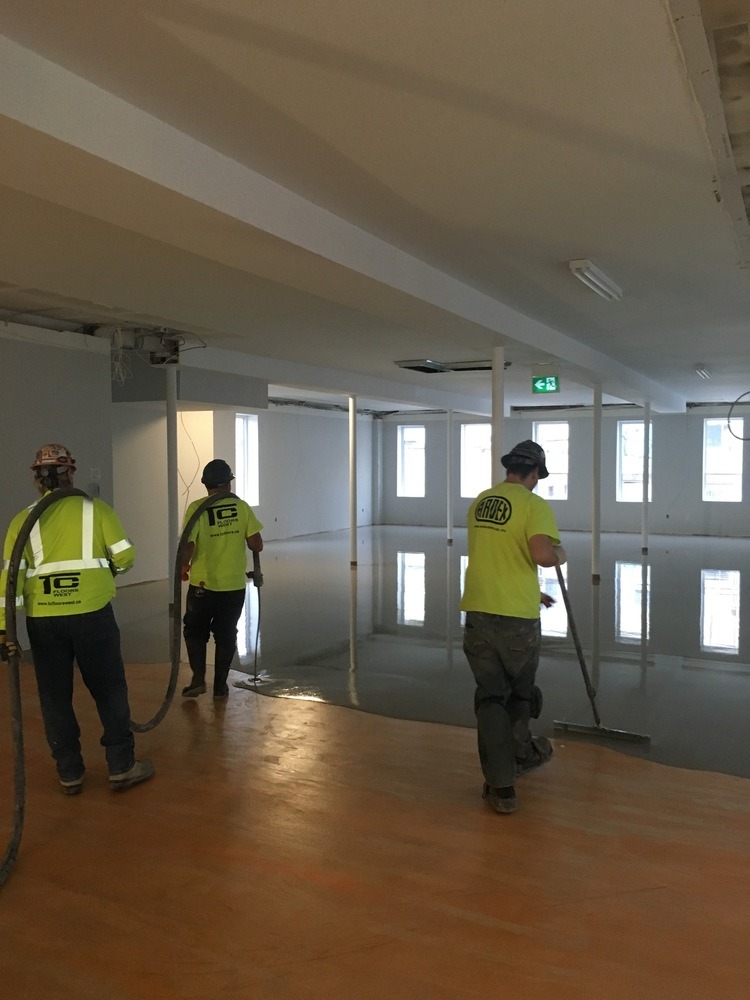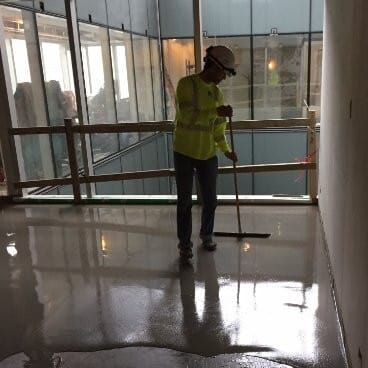
Concrete is often utilized by interior designers who want to achieve a contemporary flooring finish. They work it into commercial and residential buildings as a natural extension of an industrial chic design scheme. However, many homeowners are hesitant to agree to this drastic flooring option because they perceive concrete to be cold and damp.
Is it true that concrete flooring will make your home feel much colder?
This is one of the most pressing concerns that prevents homeowners from immediately selecting a concrete floor. The fear can definitely be justified, but you have to put it into perspective. Before you get hung up on how concrete will make your home feel, consider what your other flooring options may be.
Are you learning toward natural stone or tile flooring in lieu of coated concrete? If this is the case, then you will need to accept that all of your top choices are inherently cold materials. It will definitely give you a much different feel than a plush layer of carpet. Of course, it will also give you a much different aesthetic compared to carpet.
We can’t avoid the fact that concrete is indeed a cold material. However, you can definitely take steps to make it warmer.
How can I make concrete floors warmer?
One of the most significant benefits to a concrete floor is the ability to install a radiant heating system. You will have to plan in advance to have this wonderful system installed, but it can generate significantly more warmth in your home.
A radiant heating system is one of the most effective means of warming up your home. Most homes use the less efficient system of baseboard heating or forced air. Many homeowners can attest to the fact that they often have high heating bills, even while their homes remain uncomfortably chilly. This is typically due to the heat loss that originates in the ductwork.
With the more efficient radiant heating system, you’re less likely to lose the heated air.
The other major benefit of heating your home using radiant heating is the improved air quality. Forced air systems can often pump allergens into the air, even when you have a clean air filter installed in your HVAC system. This can lead to a variety of health problems, ranging from minor sniffling to asthmatic symptoms. Radiant heating helps homeowners to avoid this issue and improve the overall quality of their air.
Radiant heating tubes can be installed directly into the concrete as the foundation is being laid. After the tubes are laid, you can continue to coat and polish the concrete instead of installing a different floor covering on top.
These radiant heating systems can often heat your floors at night while you sleep, keeping you from running all of your electricity at once. During the day, concrete has the ability to hold onto this heat and release it periodically. A system that was charged overnight can actually keep your home warm for the next eight to ten hours.
What if I don’t want radiant heat?
If you’ve already planned your HVAC system or aren’t working on a new construction property, radiant heating may not be an option for you. That doesn’t necessarily mean that you’re doomed to live with cold concrete floors though.
Homeowners can take several practical steps to ensure that their home doesn’t feel cold due to the concrete. An easy way to make your space feel warmer is to make sure that you get plenty of sunlight in the rooms with the concrete. Sunlight naturally brings heat with it, even if it’s simply filtering in through your windows.
Similar to the way the concrete can hold onto the heat from a radiant heating system, it can also store the heat from the sunlight. These floors can absorb any sort of heat available which makes it easier for them to emit that heat back into your home.
Of course, you could also place area rugs strategically throughout your home if you’re concerned about having chilly feet. An area rug gives you a plush and warm texture without requiring any sort of professional installation. You can swap area rugs out at any time without much planning or preparation.
Isn’t a concrete floor going to be damp?
This is a common misconception about concrete flooring. Most people assume that because the floor is cold, it may also produce dampness. As long as your home meets the most common building codes and standards, it’s highly unlikely that your concrete floor is going to feel damp.
When your concrete foundation is initially laid, your contractor should install a moisture vapor barrier underneath your home. This barrier helps to eliminate moisture that rises up from the earth around the foundation of your home. Any potential water is blocked from being absorbed by the concrete, which means it isn’t likely to be released through the surface and into your home.
If your home is built in an area with extremely poor drainage, a moisture vapor barrier may not be enough. The dampness associated with a poorly drained property can lead to larger issues in the years to come, including mold and mildew growth. You should seek to remedy this situation, even if you choose to go with a different type of floor covering.
Poor drainage can be solved using French drain system or moisture remediation systems. If you think that drainage and excess moisture could be an issue for your property, it may be a good idea to have a professional take a closer look immediately.
Overall, there are a lot of common myths about the coldness and dampness that many homeowners associate with concrete flooring in Winnipeg. Many of these concerns can be addressed with relatively simple solutions to make your living space more comfortable. If you have questions regarding what you can do to make concrete floors more inviting, don’t hesitate to reach out to a professional concrete expert. You may find that it’s the ideal solution for your next home improvement project.

